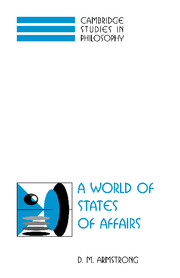Book contents
- Frontmatter
- Contents
- Preface
- 1 Introduction
- 2 Some preliminary doctrines
- 3 Properties I
- 4 Properties II
- 5 Powers and dispositions
- 6 Relations
- 7 Particulars
- 8 States of affairs
- 9 Independence
- 10 Modality
- 11 Number
- 12 Classes
- 13 Totality states of affairs
- 14 Singular causation
- 15 Laws I
- 16 Laws II
- 17 The unity of the world
- References
- Index
13 - Totality states of affairs
Published online by Cambridge University Press: 03 February 2010
- Frontmatter
- Contents
- Preface
- 1 Introduction
- 2 Some preliminary doctrines
- 3 Properties I
- 4 Properties II
- 5 Powers and dispositions
- 6 Relations
- 7 Particulars
- 8 States of affairs
- 9 Independence
- 10 Modality
- 11 Number
- 12 Classes
- 13 Totality states of affairs
- 14 Singular causation
- 15 Laws I
- 16 Laws II
- 17 The unity of the world
- References
- Index
Summary
HIGHER-ORDER STATES OF AFFAIRS
The main object of this chapter is to discuss a particular sort of higherorder state of affairs: totality facts. But it will be useful to begin by saying some things about higher-order states of affairs generally.
If it is true that what supervenes is no increase of being beyond its subvenient base, no increase beyond that which it supervenes upon, then our only concern here is with non-supervenient higher-order states of affairs. ‘Higher-order’ here, of course, has no reference to any higher realm, to anything cut off from the world of first-order states of affairs, the spacetime world if the thesis of Naturalism is true. It simply picks out those states of affairs which themselves have one or more (lower-order) states of affairs as constituents or else it picks out states of affairs that involve only universals: relations between state-of-affairs types.
Thus, suppose there is, as I maintain, singular causation involving one state of affairs bringing about another state of affairs, as it may be a's being F bringing about b's being G. Suppose this to be a genuine dyadic relation, external and not involving any further entities. Because the terms of the relation are states of affairs, this will be a higher-order state of affairs. But it is not otherworldly! Again, if one state-of-affairs type brings about a further state-of-affairs type, this is a higher-order state of affairs because it is a causal relation between universals.
- Type
- Chapter
- Information
- A World of States of Affairs , pp. 196 - 201Publisher: Cambridge University PressPrint publication year: 1997
- 2
- Cited by



